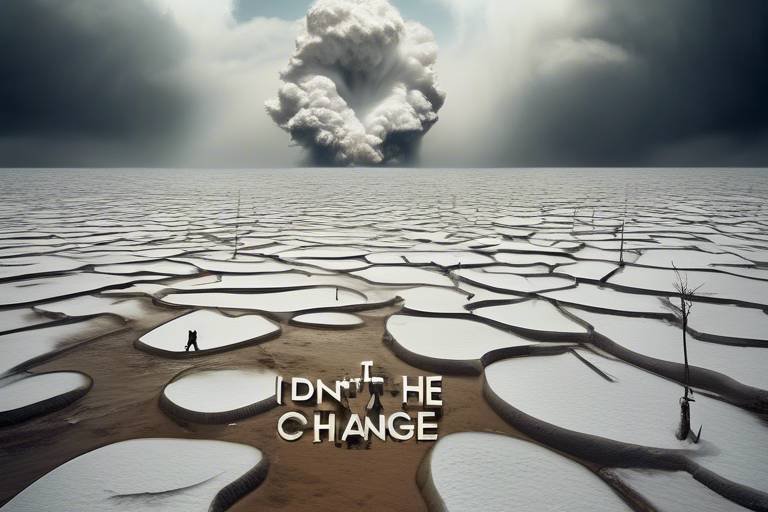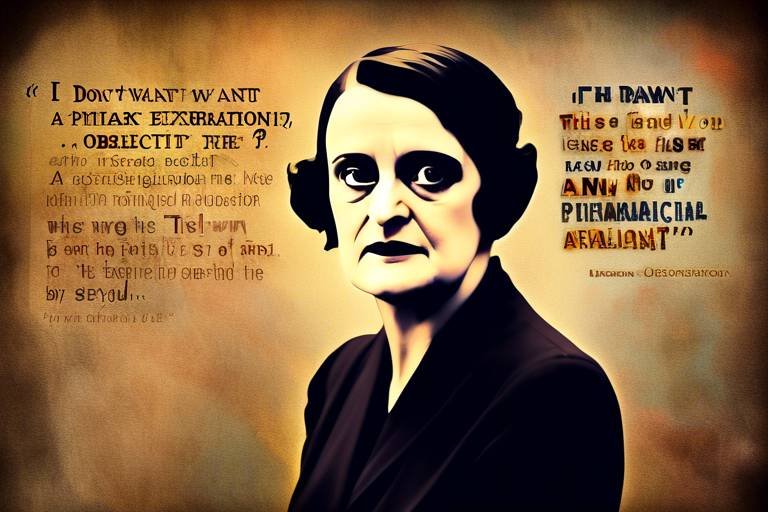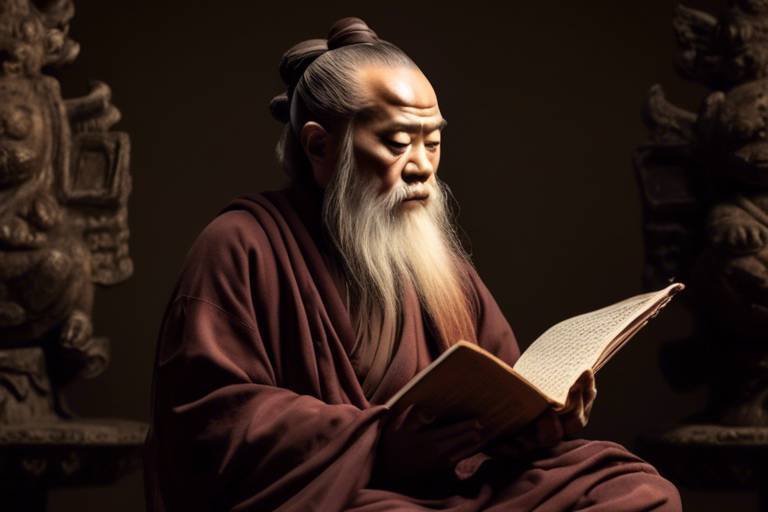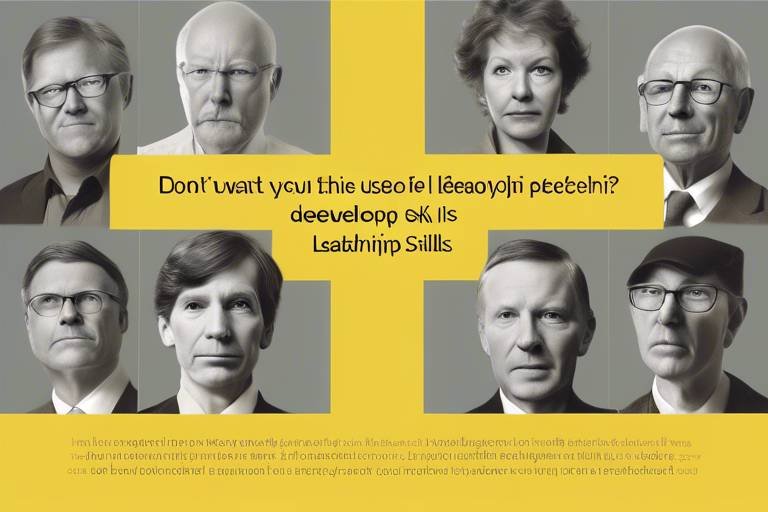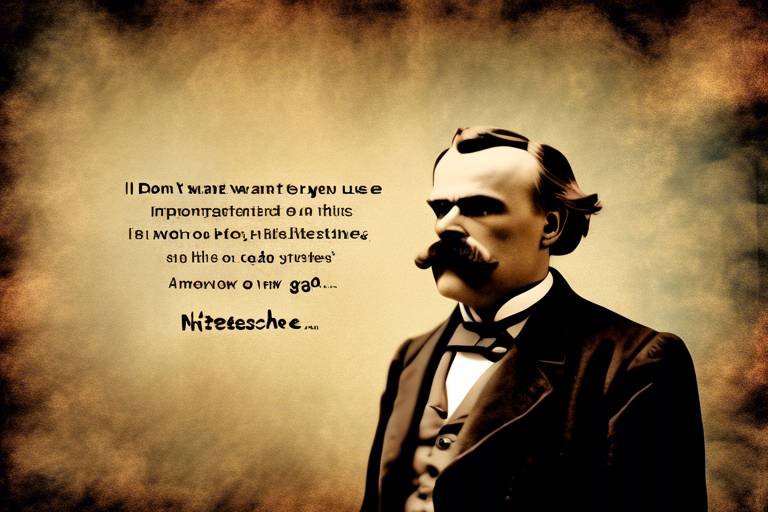The Concept of Personal Identity in Philosophy
The concept of personal identity is a fascinating and intricate topic that has captivated philosophers for centuries. At its core, it seeks to answer a fundamental question: what does it mean to be the same person over time? This inquiry is not just a mere academic exercise; it touches on our everyday lives, influencing how we perceive ourselves and interact with others. Imagine waking up one day and feeling like a completely different person—how would that change your relationships, your responsibilities, and your understanding of your own existence? This article dives deep into the philosophical discourse surrounding personal identity, examining key theories, historical perspectives, and contemporary debates that shape our understanding of what it means to be a person over time.
Throughout history, various thinkers have grappled with this question, each contributing unique insights that reflect the cultural and intellectual contexts of their times. From ancient philosophers like Plato and Aristotle to modern theorists such as John Locke and David Hume, the exploration of personal identity has evolved, revealing a tapestry of ideas that challenge and enrich our understanding of the self. The evolution of personal identity in philosophy can be traced through various historical periods, revealing how thinkers from different eras have approached the question of what constitutes the self.
In contemporary discussions, the relevance of personal identity extends beyond philosophy into fields like psychology, ethics, and even law. For instance, how do we hold individuals accountable for their actions if their memories and psychological states change over time? This question underscores the importance of understanding personal identity in a rapidly changing world where technology and social dynamics continually reshape our experiences. As we delve deeper into this topic, we will explore key philosophical theories on personal identity, including psychological continuity, biological continuity, and the bundle theory, each offering unique perspectives on what it means to be the same person over time.
The historical background of personal identity is rich and varied, with each era contributing distinct perspectives that reflect the prevailing philosophical currents. In ancient philosophy, thinkers like Plato proposed that the soul is the essence of identity, suggesting that our true selves exist beyond our physical bodies. This notion laid the groundwork for later discussions about the relationship between the body and the self.
Moving into the Enlightenment, philosophers such as John Locke introduced the idea of consciousness as a key component of personal identity. Locke argued that it is our memories and experiences that connect us to our past selves, emphasizing the role of psychological continuity in defining who we are. This perspective sparked a wealth of debate, leading to various critiques and alternative theories that continue to shape the discourse today.
In the modern era, the exploration of personal identity has expanded, incorporating insights from psychology, neuroscience, and even technology. As we grapple with questions of identity in the age of social media and digital personas, the philosophical inquiries into personal identity remain more relevant than ever.
Several key theories have emerged in the study of personal identity, each offering unique perspectives on what it means to be the same person over time. These theories can be broadly categorized into three main frameworks: psychological continuity, biological continuity, and the bundle theory.
The psychological continuity theory posits that personal identity is maintained through the persistence of psychological traits, memories, and consciousness. This theory emphasizes the role of mental states in defining the self, suggesting that as long as we retain certain memories and psychological characteristics, we remain the same person. This perspective resonates with our everyday experiences, where our memories shape our identities and influence our behavior.
Despite its appeal, critics argue that psychological continuity alone cannot fully account for personal identity. Questions arise about the reliability of memory—what happens if our memories are distorted or forgotten? Moreover, as we undergo psychological changes over time, how do we reconcile these shifts with our sense of self? These critiques highlight the complexities of defining identity solely through psychological means.
This theory has significant implications in areas such as ethics, law, and psychology. For example, discussions on moral responsibility often hinge on the notion of psychological continuity—if a person no longer remembers their past actions, can they still be held accountable? Additionally, the treatment of individuals with memory disorders raises ethical questions about identity and personhood, underscoring the importance of understanding psychological continuity in various contexts.
In contrast, the biological continuity theory suggests that personal identity is rooted in the physical body. This perspective asserts that the same biological organism remains the same person despite changes in psychological states. While this theory provides a more tangible basis for identity, it also raises questions about the relationship between body and mind, challenging us to consider how much of our identity is tied to our physical existence.
Memory plays a crucial role in shaping personal identity, as it connects past experiences to the present self. Our memories not only inform who we are but also influence our decisions and interactions with others. The reliability and nature of memory become central topics of discussion, particularly as we navigate the complexities of identity in a world that is constantly changing.
The relationship between memory and self-perception is intricate. Our memories influence how we view ourselves and our identities, impacting our decisions and interactions with others. For instance, positive memories may bolster our self-esteem, while negative experiences can lead to feelings of inadequacy. This interplay highlights the importance of understanding memory's role in shaping our identities.
As individuals undergo personal transformation, the role of memories in maintaining a coherent identity becomes a central topic. How much change can occur before we perceive our identity as lost? This question invites us to reflect on the fluidity of identity and the extent to which our memories anchor us to our past selves.
- What is personal identity? Personal identity refers to the characteristics and qualities that make an individual distinct and continuous over time.
- Why is personal identity important? Understanding personal identity is crucial for self-awareness, moral responsibility, and interpersonal relationships.
- How do memory and identity relate? Memory connects our past experiences to our present self, influencing our perception and understanding of who we are.
- Can identity change over time? Yes, identity can change due to personal experiences, psychological shifts, and external influences.

The Historical Background of Personal Identity
The exploration of personal identity is not a modern phenomenon; rather, it is a rich tapestry woven through the annals of philosophical thought. From ancient philosophers to contemporary thinkers, the question of what constitutes the self has captivated minds across cultures and epochs. The historical background of personal identity reveals a fascinating evolution of ideas, reflecting societal values and scientific advancements of each period.
In ancient philosophy, figures like Socrates and Plato laid the groundwork for discussions about the self. Socrates famously asserted that "the unexamined life is not worth living," pushing individuals to reflect on their own identities and moral character. Plato, on the other hand, introduced the concept of the Tripartite Soul, suggesting that the self is composed of rational, spirited, and appetitive elements, each contributing to one's identity. This dualistic view hinted at a separation between the physical and the metaphysical, a theme that would recur throughout history.
As we transition into the Middle Ages, the influence of religion began to shape the discourse on personal identity. Thinkers like Augustine of Hippo emphasized the importance of memory and divine knowledge in understanding the self. Augustine proposed that one's identity is deeply intertwined with their relationship with God and the eternal truths, suggesting that our memories are a reflection of divine order. This religious lens introduced a new dimension to personal identity, intertwining it with spiritual beliefs.
Moving into the Enlightenment, the focus shifted towards reason and individualism. Philosophers such as John Locke argued that personal identity is fundamentally linked to consciousness and memory. Locke's famous thought experiment, the "Prince and the Cobbler," illustrated his view that if a prince awoke in the body of a cobbler, he would still be the same person if he retained his memories. This idea sparked debates about the nature of selfhood, challenging traditional views and paving the way for modern discussions.
In the 19th and 20th centuries, the discourse on personal identity took on new dimensions with the advent of psychology and existentialism. Thinkers like Friedrich Nietzsche and Jean-Paul Sartre questioned the static nature of identity, proposing that the self is a fluid construct shaped by choices and experiences. Sartre's assertion that "existence precedes essence" underscores the idea that individuals are not defined by predetermined characteristics but rather by their actions and decisions over time.
Today, the conversation around personal identity continues to evolve, incorporating insights from neuroscience and social psychology. The interplay between biological, psychological, and social factors complicates our understanding of what it means to be the same person throughout life. This historical journey illustrates that the quest for understanding personal identity is not merely an academic exercise but a deeply human endeavor that resonates with our experiences, memories, and relationships.
As we delve deeper into the theories and implications of personal identity, it's essential to recognize how historical perspectives shape contemporary debates. The questions posed by ancient philosophers still echo in modern discussions, inviting us to reflect on our own identities in an ever-changing world.
- What is personal identity? Personal identity refers to the concept of what makes an individual the same person over time, encompassing psychological, biological, and social dimensions.
- How has the concept of personal identity evolved? The concept has evolved from ancient philosophical discussions to modern psychological and existential theories, reflecting changes in societal values and scientific understanding.
- Why is memory important in personal identity? Memory plays a crucial role in connecting past experiences to the present self, influencing how we perceive ourselves and our identities.
- What are the main theories of personal identity? Key theories include psychological continuity, biological continuity, and the bundle theory, each offering unique insights into the nature of selfhood.

When we dive into the intricate world of personal identity, we quickly discover that it's not just a straightforward concept. Instead, it’s a rich tapestry woven from various philosophical threads. Over the years, several key theories have emerged, each offering unique insights and perspectives on what it truly means to be the same person over time. Among these theories, psychological continuity, biological continuity, and the bundle theory stand out as major contenders in this philosophical debate.
The psychological continuity theory suggests that our personal identity is primarily maintained through our mental states—our thoughts, memories, and consciousness. Think of it this way: imagine a river flowing through a landscape. The water (our memories and experiences) may change as it moves, but the river itself remains the same entity. This theory emphasizes that as long as there is a connection between past and present psychological states, we can consider ourselves the same person. However, as we’ll explore later, this perspective is not without its critics.
On the other hand, the biological continuity theory takes a different approach by asserting that our identity is rooted in our physical body. According to this view, despite the myriad psychological changes we might undergo—like shifts in beliefs, preferences, or memories—we remain the same person as long as our biological organism persists. Picture it like a tree; while the leaves may change with the seasons, the tree itself remains a singular entity. This theory appeals to those who prioritize the physical aspects of existence over the mental.
Lastly, we have the bundle theory, which presents a more radical perspective. This theory posits that what we call "self" is merely a collection of experiences, perceptions, and memories, akin to a bundle of sticks. There is no underlying substance that holds these experiences together; rather, our identity is a compilation of various elements that come together to form the idea of "me." This view challenges the very notion of a stable self, suggesting that we are constantly in flux, shaped by our interactions and experiences.
As we navigate through these theories, it's essential to recognize that each offers valuable insights into the complexities of personal identity. They provoke thought and encourage us to question our understanding of who we are. Are we defined by our memories, our biological existence, or the fleeting experiences that shape us? The answer may not be as clear-cut as we would like it to be.
In the end, the discourse surrounding personal identity is more than just an academic exercise; it touches upon our core understanding of selfhood and existence. As these theories continue to evolve and intersect with contemporary debates in ethics, psychology, and law, they remind us that the question of identity is not just philosophical—it’s profoundly personal.
- What is personal identity? Personal identity refers to the concept of what makes an individual the same person over time, despite changes in their physical or psychological state.
- Why is personal identity important in philosophy? Understanding personal identity helps us explore questions about morality, responsibility, and the nature of self, which are crucial in both ethical discussions and everyday life.
- What are the main theories of personal identity? The main theories include psychological continuity, biological continuity, and the bundle theory, each offering different perspectives on how we maintain our identity over time.
- How do memories influence personal identity? Memories play a pivotal role in shaping our self-perception and continuity of identity, as they connect our past experiences to our present self.

The Psychological Continuity Theory is a fascinating and thought-provoking perspective in the realm of personal identity. At its core, this theory suggests that what makes you, well, you, is not just your physical body but rather the continuity of your psychological traits, memories, and consciousness over time. Imagine for a moment that your mind is like a river, constantly flowing yet retaining its essence. This theory posits that even as we change—through experiences, learning, and emotional growth—there's a thread of psychological continuity that binds our past selves to our present and future selves.
One of the key components of this theory is the idea that our memories play a pivotal role in maintaining our identity. Think about it: when you recall a cherished childhood memory, you’re not just reminiscing; you’re reconnecting with a part of yourself that has shaped who you are today. This connection between memory and identity leads to the assertion that as long as there is a psychological link—such as memories, values, and personality traits—between your past and present, you remain the same person. However, this raises some intriguing questions: What happens if our memories fade? Or if we undergo significant psychological changes?
To delve deeper, let’s consider the implications of psychological continuity in real-life scenarios. For instance, in the field of law, the theory can influence discussions around moral responsibility. If someone commits a crime but later undergoes a profound psychological change—say, they develop a new set of beliefs or experiences that alter their personality—do they still bear the same moral responsibility for their past actions? This conundrum highlights the complex interplay between memory, identity, and accountability.
Moreover, psychological continuity theory also intersects with discussions in psychology, particularly concerning individuals with memory disorders. For example, consider someone with Alzheimer's disease. As their memories fade, does their identity diminish as well? This situation prompts a reevaluation of how we define identity—if a person's memories are integral to their sense of self, what does it mean when those memories are lost? The theory invites us to explore these challenging questions, suggesting that while our psychological traits are crucial, they may not be the sole determinants of our identity.
In summary, the Psychological Continuity Theory offers a rich framework for understanding personal identity. It emphasizes the importance of psychological traits and memories in defining who we are over time. Yet, as we navigate through this theory, we must remain open to the complexities and nuances that arise, recognizing that identity is a multifaceted concept that may not be easily pinned down to a single definition.
- What is Psychological Continuity Theory? - It is a philosophical perspective that asserts personal identity is maintained through the continuity of psychological traits and memories over time.
- How do memories influence identity? - Memories connect our past experiences to our present self, shaping how we perceive ourselves and our choices.
- Can someone lose their identity if they lose their memories? - This is a contentious issue; while memories are crucial to our identity, other factors such as personality traits and values also play a role.
- What are the implications of this theory in law? - The theory raises questions about moral responsibility, particularly when an individual's psychological state changes significantly.

The Psychological Continuity Theory has garnered significant attention in philosophical circles, but it is not without its critics. One of the main arguments against this theory is its reliance on memory. Critics assert that memories can be unreliable, and they can fade or alter over time. This raises a crucial question: if our memories are not stable, how can they serve as the foundation for our identity? Imagine trying to build a house on a shaky foundation; it may stand for a while, but eventually, it could crumble. This analogy highlights the precarious nature of relying solely on psychological traits to define who we are.
Moreover, the theory faces challenges when it comes to changes in mental states. For instance, consider individuals who suffer from amnesia or severe psychological disorders. If a person loses their memories or experiences a significant shift in their mental state, do they cease to be the same person? Critics argue that such transformations can lead to a disconnection between past and present selves, complicating the notion of a singular identity. This brings us to another point of contention: the nature of identity itself. Is it a continuous thread woven through our experiences, or is it more akin to a patchwork quilt, where different pieces represent different stages of our lives?
Additionally, some philosophers propose that psychological continuity might not account for the physical changes we undergo throughout our lives. Our bodies evolve, and our biological makeup shifts; thus, how can we claim to be the same person if our physical selves are in a constant state of flux? This critique suggests that a more holistic approach may be necessary to understand personal identity fully. It invites us to consider an integrated view that encompasses both psychological and biological continuity.
Lastly, a critical examination of the implications of Psychological Continuity Theory raises ethical concerns. If identity is solely based on psychological traits, what does that mean for individuals who may have compromised mental capacities? For example, how do we treat individuals with dementia or other cognitive impairments? This theory could lead to troubling conclusions regarding moral responsibility and the treatment of such individuals in society. Are they still the same persons they once were? This question not only challenges the theory but also compels us to re-evaluate our understanding of personhood and dignity.
- What is Psychological Continuity Theory?
Psychological Continuity Theory posits that personal identity is maintained through the persistence of psychological traits, memories, and consciousness. - What are the main critiques of this theory?
Critics argue that memory can be unreliable, that significant psychological changes can disrupt continuity, and that physical changes challenge the notion of a singular identity. - How does this theory impact ethical considerations?
It raises questions about moral responsibility and the treatment of individuals with cognitive impairments, challenging our understanding of personhood.

The theory of psychological continuity has far-reaching implications that extend beyond mere philosophical debate; it touches on various aspects of our lives, including ethics, law, and psychology. To illustrate this, consider how our understanding of personal identity influences our moral responsibilities. If we believe that our identity is tied to our memories and psychological traits, then the question arises: how accountable are we for our past actions? This is particularly relevant in legal contexts where a defendant's mental state at the time of a crime can affect the outcome of a trial. For instance, if a person has a memory disorder, can they be held fully responsible for actions that they may not clearly remember?
Moreover, psychological continuity plays a vital role in therapy and mental health treatment. Therapists often work to help individuals reconnect with their past experiences and memories to foster a sense of identity and continuity. This is especially crucial for those suffering from conditions such as PTSD or dissociative disorders, where individuals may feel fragmented or disconnected from their past selves. By understanding and integrating these memories, individuals can rebuild a cohesive narrative of their identity, leading to greater emotional stability and personal growth.
In the realm of ethics, psychological continuity raises intriguing questions about the moral implications of changes in personality or memory. For instance, if someone undergoes a significant personality change due to trauma or illness, do they remain the same person? This question is not just philosophical; it has real-world implications for how we treat individuals undergoing such changes. Are they still deserving of the same rights and considerations as their former selves? Understanding the nuances of psychological continuity can help guide ethical decision-making in these situations.
Furthermore, psychological continuity also intersects with discussions surrounding artificial intelligence and technology. As we develop machines capable of mimicking human thought and memory, we must ask ourselves: what does it mean for an AI to have a 'self'? If an AI can simulate psychological continuity, does it deserve to be treated as a person? These questions challenge our conventional notions of identity and push us to reconsider the boundaries of personhood in an increasingly technological world.
In summary, the applications of psychological continuity are vast and multifaceted, influencing not only philosophical discourse but also practical issues in ethics, law, and mental health. By exploring these implications, we can gain deeper insights into the complexities of personal identity and how it shapes our understanding of ourselves and others.
- What is psychological continuity? Psychological continuity refers to the persistence of psychological traits, memories, and consciousness that define an individual's identity over time.
- How does psychological continuity affect moral responsibility? It raises questions about accountability, especially in cases where an individual's memories or mental states are compromised.
- Can psychological continuity change over time? Yes, psychological continuity can change due to experiences, trauma, or mental health conditions, leading to debates about the essence of personal identity.
- What role does memory play in psychological continuity? Memory is crucial as it connects past experiences to the present self, influencing how individuals perceive their identity.

This article explores the philosophical discourse surrounding personal identity, examining key theories, historical perspectives, and contemporary debates that shape our understanding of what it means to be a person over time.
The evolution of personal identity in philosophy can be traced through various historical periods, revealing how thinkers from different eras have approached the question of what constitutes the self.
Several key theories have emerged in the study of personal identity, including psychological continuity, biological continuity, and the bundle theory, each offering unique perspectives on what it means to be the same person over time.
Psychological continuity theory posits that personal identity is maintained through the persistence of psychological traits, memories, and consciousness, emphasizing the role of mental states in defining the self.
Critics argue that psychological continuity alone cannot fully account for personal identity, raising questions about the reliability of memory and the impact of psychological changes over time.
This theory has significant implications in areas such as ethics, law, and psychology, influencing discussions on moral responsibility and the treatment of individuals with memory disorders.
Biological continuity theory suggests that personal identity is rooted in the physical body, asserting that the same biological organism remains the same person despite changes in psychological states. This perspective emphasizes that our identity is intrinsically linked to our biological makeup, which remains relatively stable over time, even as our thoughts and feelings may fluctuate. Think about it: when you look in the mirror, you recognize yourself not just because of your memories or personality traits, but because of the physical body that has been with you through the years. This theory argues that regardless of how much you change mentally, the continuity of your biological form is what fundamentally ties you to your past self.
One of the key implications of biological continuity is the idea that our physical existence serves as a constant anchor in our identity. For instance, consider situations like severe memory loss or personality changes due to trauma or illness. While these experiences can alter how we perceive ourselves, the biological continuity theory posits that, at a fundamental level, we remain the same person because our biological organism continues to exist. This idea can be illustrated in the following table:
| Aspect | Psychological Continuity | Biological Continuity |
|---|---|---|
| Focus | Mental states, memories | Physical body, biological organism |
| Change over time | Can lead to identity shifts | Identity remains stable |
| Examples | Alzheimer's disease | Same person despite aging |
However, this theory is not without its critiques. Some philosophers argue that simply being biologically continuous does not capture the full essence of what it means to be a person. For example, if a person undergoes a full body transplant, does their identity transfer along with their biological body? Questions like these challenge the notion that physical continuity alone can define personal identity. It raises the question: Is it the body that makes us who we are, or is it our experiences and memories that shape our identity?
Moreover, the biological continuity theory leads to fascinating discussions about the implications of identity in medical ethics and law. For instance, when considering organ donation or brain death, how do we navigate the complexities of identity? If a person's body is sustained but their consciousness is gone, do we still consider them the same person? These discussions highlight the intricate relationship between our biological existence and our perceived identity, illustrating that the question of who we are is as much about our physical form as it is about our mental states.
Memory plays a crucial role in shaping personal identity, as it connects past experiences to the present self, leading to discussions about the reliability and nature of memory in defining who we are.
The relationship between memory and self-perception is complex, as our memories influence how we view ourselves and our identities, impacting our decisions and interactions with others.
As individuals undergo personal transformation, the role of memories in maintaining a coherent identity becomes a central topic, raising questions about how much change can occur before identity is perceived as lost.
- What is personal identity? Personal identity refers to the qualities, beliefs, personality, looks, and expressions that make a person or group different from others.
- Why is memory important for personal identity? Memory helps us connect our past experiences with our present selves, shaping how we perceive our identity over time.
- How does biological continuity differ from psychological continuity? Biological continuity focuses on the physical body as the basis of identity, while psychological continuity emphasizes mental states and memories.
- Can a person's identity change over time? Yes, a person's identity can change due to various factors, including experiences, memories, and psychological changes.

Memory is like the glue that holds our identity together, creating a bridge between our past experiences and our present self. It’s fascinating to think about how our memories shape who we are today. Have you ever considered how a single memory can evoke a flood of emotions, transporting you back to a moment in time? This intricate relationship between memory and personal identity is what makes it such a compelling topic in philosophy. Our memories not only influence our self-perception but also play a crucial role in our interactions with others and the decisions we make.
When we think about personal identity, we often realize that it’s not just about the physical changes we undergo over time but also about the continuity of our memories. Imagine meeting someone after many years; they might have changed in appearance, but if you share memories with them, that connection feels intact. This phenomenon raises intriguing questions: If someone loses their memories, are they still the same person? Or what if they remember events differently than how they happened? These questions highlight the complexity of memory and its role in defining our identities.
To delve deeper, we can categorize the role of memory in personal identity into a few key areas:
- Memory and Self-Perception: Our memories significantly influence how we perceive ourselves. Positive memories can boost our confidence and self-esteem, while negative memories might lead to feelings of inadequacy or anxiety. This self-perception shapes our interactions with the world around us.
- Memories and Personal Change: As we grow and evolve, our memories can either anchor us to our past or push us to redefine our identity. For instance, a person who has overcome significant challenges may look back at their memories with a sense of pride, while others might struggle to reconcile their past with their present self.
- Reliability of Memory: The reliability of our memories is another critical aspect. Memories can be distorted or forgotten over time, leading to questions about their authenticity. If our memories aren’t entirely accurate, how can they serve as the foundation of our identity?
These considerations illustrate that memory is not merely a passive repository of past experiences; it actively shapes our identity and influences our behavior. Philosophers and psychologists alike have explored these themes, emphasizing how our recollections contribute to the narrative we tell ourselves about who we are. For instance, a person who remembers their childhood as filled with joy and love may develop a more optimistic outlook on life compared to someone whose memories are laden with trauma and hardship.
In essence, memory acts as a thread weaving through the tapestry of our lives, connecting our past to our present and influencing our future. It raises profound questions about the nature of identity: Are we the sum of our memories, or is there more to our identity than just what we remember? As we navigate through life, these questions become increasingly relevant, compelling us to reflect on the intricate relationship between memory and personal identity.
- How does memory influence personal identity?
Memory shapes our self-perception and influences our decisions and interactions with others, creating a sense of continuity in our identity. - What happens to personal identity when memories are lost?
When memories are lost, it can lead to questions about the continuity of identity, as memories play a crucial role in defining who we are. - Can memories change over time?
Yes, memories can be distorted or altered, raising questions about their reliability and the impact on personal identity.
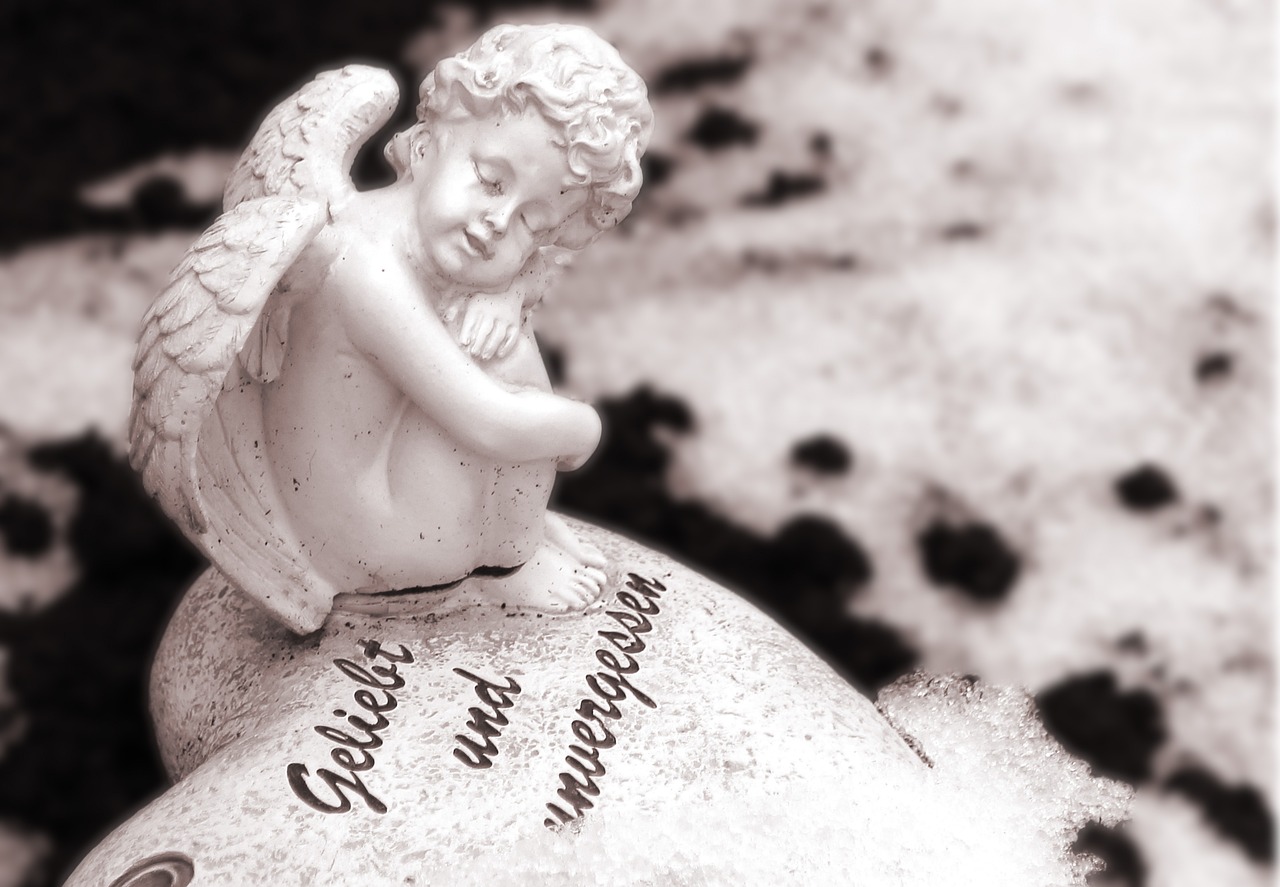
Memory and self-perception are intricately intertwined, creating a complex web that shapes our identities. Think about it: our memories are like the threads in a tapestry, weaving together experiences, emotions, and lessons learned throughout our lives. They help us form a coherent narrative about who we are and where we come from. Without memory, we would be like a book with blank pages, lacking the stories that define us. This relationship raises fascinating questions: How do our memories influence our self-image? Can we truly trust our memories to reflect who we are?
As we navigate through life, our memories play a pivotal role in shaping our self-perception. They not only inform our understanding of past experiences but also influence our current beliefs and future aspirations. For instance, a positive memory of overcoming a challenge can boost our confidence and motivate us to tackle new obstacles. Conversely, negative memories may lead to self-doubt and fear of failure. So, how do these memories shape our perception of ourselves?
To delve deeper into this, we can categorize the impact of memory on self-perception into several key areas:
- Identity Formation: Our memories contribute significantly to how we see ourselves. They help us construct a narrative that defines our identity, from our childhood experiences to our adult achievements.
- Emotional Regulation: Memories can evoke strong emotions, influencing our mood and behavior. Positive memories can lift our spirits, while negative ones may lead to sadness or anxiety.
- Decision Making: The memories we hold often guide our choices. For example, if we remember a time when taking a risk paid off, we might be more inclined to embrace similar opportunities in the future.
Moreover, the reliability of memory plays a crucial role in self-perception. Our memories are not always perfect; they can be influenced by emotions, biases, and even the passage of time. This leads to the phenomenon of memory distortion, where what we remember may not accurately reflect what actually happened. This can cause discrepancies in how we perceive ourselves, as we might hold onto idealized versions of our past or, conversely, be haunted by distorted recollections of failures.
As we consider the implications of memory on self-perception, it becomes evident that our identities are not static. They are dynamic and evolve with each new experience and memory we acquire. Just like a river flows and changes course, our self-perception can shift over time. This ongoing transformation raises a crucial question: how much can we change before we feel we have lost our identity? The interplay between memory and self-perception invites us to explore the essence of who we are, challenging us to embrace change while remaining grounded in our past.
In conclusion, memory is not just a repository of past events; it is a vital component of our self-perception. By understanding this intricate relationship, we can gain insights into our identities and how we navigate the world. As we reflect on our memories, we are reminded that they are not just fragments of our past but foundational elements that shape our present and future selves.
- How does memory affect our self-identity? Memory shapes our self-identity by providing a narrative of our experiences, influencing how we view ourselves and our actions.
- Can memories change over time? Yes, memories can change due to various factors such as emotions, new experiences, and the passage of time, leading to potential distortions in how we remember past events.
- What role do emotions play in memory? Emotions significantly impact how we remember events; emotionally charged memories are often more vivid and easier to recall than neutral ones.

When we think about our identities, it’s impossible to ignore the profound impact of memories on our sense of self. Memories are like the threads that weave the fabric of who we are, connecting our past experiences to our present reality. But what happens when we undergo significant personal changes? Can we still claim to be the same person we were before? This question opens a Pandora's box of philosophical inquiry, as the relationship between memories and personal change is anything but straightforward.
As we journey through life, we accumulate a myriad of memories that shape our beliefs, values, and behaviors. These memories can be joyous, like the day we graduated or the moment we fell in love, or they can be painful, such as the loss of a loved one or a failure we faced. Each memory contributes to our self-perception and influences how we interact with the world. However, as we grow and evolve, some memories may fade or change, leading us to question whether we are still the same person we once were.
Consider this: if a person experiences a significant life change—such as moving to a new country, changing careers, or undergoing a major personal transformation—how do their memories factor into their identity? Are they still the same individual, or has their identity shifted along with their life experiences? This is where the concept of personal change comes into play. Personal change can be viewed as a spectrum, with some individuals experiencing gradual shifts while others may undergo more radical transformations.
To illustrate this, let’s take a look at a simple table that outlines different types of personal changes and their potential impact on identity:
| Type of Change | Impact on Identity |
|---|---|
| Minor Life Changes | Typically preserve core identity; memories remain largely intact. |
| Major Life Events | Can lead to reevaluation of self; some memories may be reinterpreted. |
| Radical Transformations | May result in a significant shift in identity; old memories may feel foreign. |
This table highlights the varying impacts that different types of changes can have on our identity. For instance, a minor change, like starting a new hobby, might not alter our sense of self significantly. However, a major life event, such as becoming a parent or losing a job, can prompt us to reassess our memories and how they relate to our current identity. In some cases, individuals who undergo radical transformations, such as a complete lifestyle overhaul, might find that their old memories feel disconnected from their new selves.
Furthermore, the way we perceive our memories can also shift over time. As we grow older, we might reinterpret our past experiences in light of new knowledge or insights. This phenomenon raises the question: Are we merely a collection of memories, or is there something more that constitutes our identity? The answer is likely a combination of both, as memories serve as crucial markers in our lives but do not solely define us.
Ultimately, memories and personal change are intricately intertwined. They shape our identities, yet they are also subject to the ebb and flow of our life experiences. As we navigate through various stages of life, it’s essential to recognize that while our memories play a significant role in defining who we are, they are just one part of a much larger picture that encompasses our evolving identities.
- What is personal identity? Personal identity refers to the concept of what makes an individual distinct and continuous over time, encompassing memories, experiences, and characteristics.
- How do memories influence personal identity? Memories shape our self-perception and influence our decisions and interactions, providing a narrative that connects our past with our present.
- Can a person change their identity? Yes, personal change can occur through life experiences, and while some memories may fade or change, core aspects of identity can remain intact or evolve.
- What are the key theories of personal identity? Key theories include psychological continuity, biological continuity, and the bundle theory, each offering different perspectives on what constitutes a person's identity over time.
Frequently Asked Questions
- What is personal identity in philosophy?
Personal identity in philosophy refers to the concept of what it means to be the same person over time. It explores questions about the self, continuity, and how our identities are shaped by various factors, including memory, psychological traits, and biological aspects.
- How has the understanding of personal identity evolved historically?
The understanding of personal identity has evolved significantly throughout history. Different philosophical eras have contributed various perspectives, with early thinkers focusing on metaphysical aspects, while contemporary discussions often emphasize psychological and biological continuity.
- What are the key theories of personal identity?
There are several key theories regarding personal identity, including psychological continuity, biological continuity, and the bundle theory. Each theory offers unique insights into what constitutes the same person over time, with psychological continuity emphasizing mental states and biological continuity focusing on the physical body.
- What is psychological continuity theory?
Psychological continuity theory posits that our identity is maintained through the persistence of psychological traits, memories, and consciousness. It suggests that as long as there is a connection in our mental states over time, we remain the same person.
- What are the critiques of psychological continuity?
Critics of psychological continuity argue that it cannot fully account for personal identity. They raise concerns about the reliability of memory, the potential for psychological changes, and how these factors might challenge our sense of being the same person throughout our lives.
- How does biological continuity theory differ?
Biological continuity theory asserts that personal identity is rooted in the physical body. According to this view, even if our psychological states change, we remain the same person as long as our biological organism remains unchanged.
- What role does memory play in personal identity?
Memory plays a crucial role in shaping our personal identity, as it connects our past experiences to our present self. This relationship influences how we perceive ourselves and can impact our decisions and interactions with others.
- Can personal identity change over time?
Yes, personal identity can change over time. As individuals undergo personal transformations, the role of memories and experiences in maintaining a coherent identity becomes a central question, prompting discussions about how much change can occur before we perceive our identity as lost.











